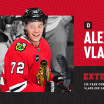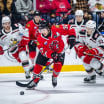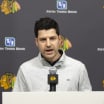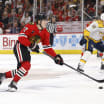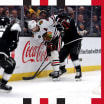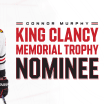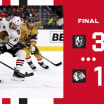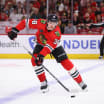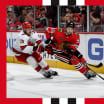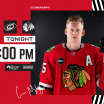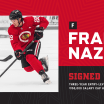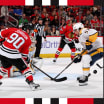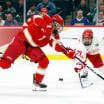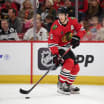On Thursday, we introduced a new segment called "Sessions With Stan" that features Blackhawks Senior Vice President/General Manager Stan Bowman sitting down with Senior Writer Chris Kuc at various points of the season to answer questions about Bowman's approach to building the team into a postseason contender. Bowman does not have previous knowledge of the questions coming his way and has embraced the idea of informing fans of the rationale behind his decisions to improve the team.
In Part 1
, Bowman discussed drafting Kirby Dach with the No. 3 overall pick, Brent Seabrook's contract, what ailed the Blackhawks last season and more.
In Part 2, we delve deeper into Bowman's mindset ahead of the free-agency signing period that begins Monday, the biggest needs still to be addressed, why the 2019-20 season is a critical one for the organization and a lunch conversation with an optimistic Patrick Kane.
Sessions with Stan: Offseason Building, Pt. 2
SVP/GM Stan Bowman dives into free agency, offseason needs and why 2019-20 is a crucial year
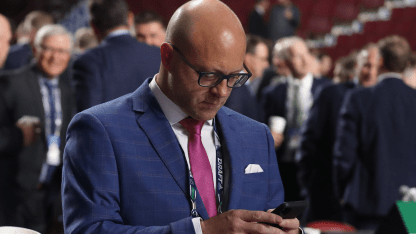
KUC: Considering the Blackhawks have missed the playoffs the last two seasons and haven't gotten out of the first round since 2015, how important will 2019-20 be for the franchise?
BOWMAN: It's a critical season next year because two years ago we went from being a really good team and we dropped way down to 76 points. This year we were back up to 84 points so we can't now go back down. We've got to keep climbing. Whether it's 90, 95 or 100 points we've got show progression next season because we have to build on the momentum we have. So from that perspective it's critical that we don't take a step backward.
I try not to make just blind goals that we need to have this many points but we do have to show a progression from last season so that when we're sitting here a year from now hopefully we're talking about Stanley Cup days and when you're getting the Cup. But the important thing is looking at a progression from where we ended last season. We have to be better and that's going to come through a couple of ways.
We've already have a couple (defensemen Olli Maatta and Calvin de Haan) that we've traded for and we're going to bring in some other players through either free agency or trade over the next month and by the end of it, we're going to have new faces and hopefully better players. But we're also going to have new coaches, schematically be a little bit different to hopefully enhance our team game that way and then, the most important thing is, the guys who were here last year are going to have a step up from where they were in November as far as comfort level and familiarity.
Following the acquisitions Maatta and de Haan, how confident are you that you've addressed the biggest area of need, which is to keep pucks out of the net?
I think our defense is pretty well set at this point. We have eight guys who all have NHL experience. (Carl) Dahlstrom has played the least of those guys but he's the youngest. But the top six guys all have several hundred games under their belt, so we're not going into next season hoping a guy can play or make it in the league. Now, it's going to be a matter of finding the right combinations of those guys. But I feel much more comfortable that when we go into a game on the road against a tough opponent and you don't get to choose the matchup. We have a lot more options for our coaches to put on the ice and feel like they can get this done.
Last year, there was probably a smaller group of guys that you trust and then if those guys just got off the ice after a long shift, the coach is like, 'I don't know how this is going to go. Who do I really trust to be able to buckle down and match up against the best players on the other team?' So we have more options from that perspective.
So, what is the objective now?
The biggest thing we need to improve are the third and fourth lines and we have to get players who can embrace their role as checkers and be really good penalty killers, players that can night in and night out match up against the other team's offensive players and neutralize them.
Ideally, we don't have to play Jonathan (Toews) against those guys. He can do it, he's been doing it his whole career, but our team would be really good if we can have someone else who was competent and capable so when we're playing the Edmonton Oilers here at the United Center and they start Connor McDavid, then we can put someone other than Toews out there. If they can hold their own, then Johnny can come out next and he's playing not against the best offensive players on the other team and we can hopefully net out better.
But that's a tough role. It's a player that has to have some experience - it's not going to be a rookie. They have to understand the defensive scheme of the team, they have to be willing to kind of dig in in their own end and not be in a real antsy mood to get going the other way and they have to understand that they're going to get a lot of defensive zone faceoffs against good players. They have to battle to win that puck, they have to get it out of their zone, they have to get in on the forecheck to keep them down there and then change and let the other guys come and hopefully be in a better position on the ice.
We don't have enough players that have that mentality or the experience level to do that. Those are the kind of guys that we're targeting, moreso than a guy who scored 30 goals last year and had 60 points and is a great power-play guy. Like right now, he wouldn't be on our power play. Our power-play unit was very good the second half of the season. Units will change, probably, as the season goes but you've got (Alex) DeBrincat, (Dylan) Strome, (Patrick) Kane, (Jonathan) Toews and (Erik) Gustafsson, so if you're bringing in a guy who is a great power-play player and you're going to use him on your second power play, all of sudden you've sort of done him a disservice.
As a result, we're looking at trades because there are some players on other teams that fit the profile that I've just described but they're missing the guys that score. Their power play struggled, they didn't generate much, they lost a lot of close games so they're looking in free agency for guys who can help them and they may move out some of these other guys.
For the first time in a long time, you've got some room under the NHL's salary cap. So why go the trade route instead making a big splash in free agency?
Cost certainty of the cap hit, as well as the term, is something that is appealing in a trade. I don't know if we're going to be trading for guys who have six-year contracts. It's possible if we find the right guy and the cap number fits in line, so I wouldn't rule it out, but the two trades we made they've got two years left and three years left. I think that's a nice window and the cap hits are manageable. They're in line with where they're going to play on our roster.
We have a lot of really good young players that will be here in the next couple of years. Some of them will arrive next season, some the year after and some the year after that. So you don't want to have everybody locked up for five years. If you're going to sign a high-end free agent July 1, they get the term because there is enough demand. You might want to give them three years but someone will give them five and before you know it if you want to get in the game with that guy you have to give them five- or six-year term.
Is it also about having money to spend on when DeBrincat's and Strome's contracts are up next season?
DeBrincat and Strome play a very important role, which is creating offense. That's not a common phenomenon around the league. A lot of teams are searching for goals so we don't want to lose that attribute. We want to try to just supplement it with some players that can help in the areas where we're weak. Those guys are important players, we want to keep them here beyond just next season. We want to keep them here for a number of seasons because they do something that is hard to do, which is score.
So from that perspective we're looking beyond just July 1 of 2019, we're looking at where we're going to be July 1 of 2020 and 2021. So it's not just, well, let's not sign anyone then, let's just give up. We're trying to get a little bit more focused and targeted additions that are going to help us.
But the NHL is all about winning. How do you resist the urge to spend up to the cap to put yourself in a better position immediately?
I think the biggest thing is I've been doing it long enough to know that the short-term excitement of having a high moment in early July goes away pretty quickly when you suddenly have to start jettisoning really good younger players. Once a player is signed, you can't un-sign him.
I feel like that's a temptation you have to resist. Now, if it's a guy coming in on a one-year deal, we're not opposed to that. It's just hard to convince these free agents to come on a one-year because they have limited time to earn their money so they sort of want to cash in when they can.
We sort of lived that life of what it's like to have to shed assets to just get compliant and that's a hard position to be in. You take your team and let's say you have a good season and all of a sudden you need to get rid of things just to bring the same group back because you're going to have a few players who are going to make a lot more money. I'm not sure they're going to be six times better than the year before but they're going to be paid six times more. So it's hard to make it work and I feel like you never really get ahead with that type of mentality.
There are no shortcuts to the process. If you look at the teams that have won, where were they two years ago or three years ago? There's a progression to your team. It's unlikely that a team just goes from being a bad team to just winning. I feel like we took a big step backward a couple of years ago and took a step forward this year and need a couple more steps forward. It is a process. We managed to maintain our high level for a longer time than most teams can but that's the past and we're not trying to live in the past. Here's where we are today and we do need to show progress and I think we can get there with the moves we've made and a few more moves.
Tell me about a meeting that you recently had with a certain No. 88.
I had lunch with Patrick Kane in Slovakia. I was over there helping the U.S. team out and he was on the team. It was mid-May and he was talking about how excited he was for the way our team seemed to finally understand what Jeremy (Colliton's) vision was and he said, 'The thing I like about it is that it is so simple to understand. I'm not sure why it took us as long as it did but I'm really excited to get to training camp because we're so far ahead of where we were and we ended on a good note as far as our team game being much better in March and early April than it had been in December.'
So I think we've done a lot of heavy lifting for our core players and they drive the boat to a large degree. As much as these peripheral players are going to play a role, we're still going to need our top guys to drive this thing for us. Patrick offered it up by saying, 'I'm excited about where we're going with how Jeremy coaches. It really makes sense.'
We should be much, much better than we were. Even if we have the same exact group and didn't make one change, brought the same group that played Game 82 and started in training camp, we should be a much better team. But we're going to hopefully upgrade. We already have on defense and now we have to find a few forwards as well that can complement our group.


